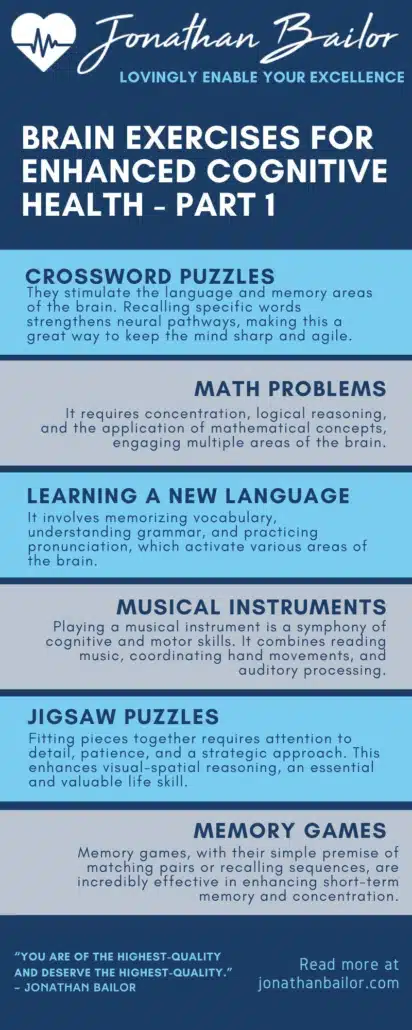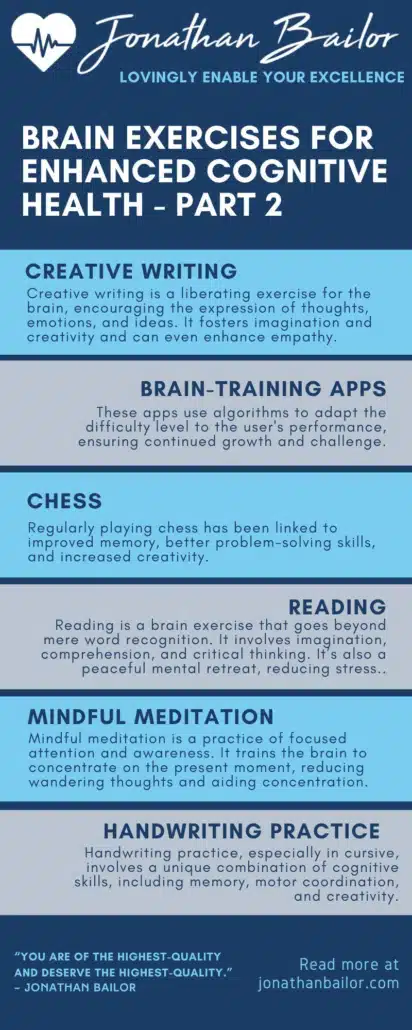12 Essential Brain Exercises for Enhanced Memory and Sharpness
In the quest for a vibrant and youthful essence, nurturing the mind is just as crucial as caring for the body. Here are some brain exercises for exceptional cognitive function in the Brain Health Guide by Jonathan Bailor!
Imagine unlocking the potential to enhance cognitive function, memory, and overall brain health with simple yet powerful exercises. The mind, a wondrous entity, thrives on challenge, engagement, and stimulation. It’s never too late to journey towards a sharper, more intelligent brain.
This exploration into brain health isn’t just about warding off forgetfulness or enhancing memory recall; it’s a pathway to enriching life’s experiences, making every moment count, and connecting more deeply with loved ones. Picture a daily routine where enhancing mental agility becomes a joyful and fulfilling part of life. From puzzles that tease the intellect to activities that foster creativity, the spectrum of exercises designed to boost brain function is both vast and intriguing.
The beauty of embarking on this cerebral enhancement journey is that it doesn’t require special equipment or a significant time investment. Small, consistent efforts can lead to profound changes, impacting everything from problem-solving skills to the ability to enjoy conversations and stories.
Imagine impressing family and friends with a quick wit, a vast reservoir of knowledge, and the ability to recall precious memories quickly. These are not just dreams but attainable goals, thanks to the transformative power of dedicated brain exercises.
This guide to brain exercises is crafted to be your companion in unlocking a more vibrant, engaged, and intellectually fulfilling life. Each exercise is designed with simplicity and effectiveness, ensuring that improving brain health is accessible and enjoyable for everyone. Whether it’s to enhance daily life, stay connected with family and friends, or enjoy the richness of a well-nourished mind, these exercises are a step towards realizing those aspirations.
When we share our journey towards improving our brain health with others, we create a sense of community and happiness. It is wonderful to connect with like-minded individuals who are also striving to achieve better brain health. It’s a beautiful opportunity to connect, grow, and thrive together. So, embark on this adventure towards a sharper, smarter brain, and let the ripple effect of your actions inspire those around you. After all, a mind that keeps learning, engaging, and exploring is a mind that lives fully.
The Essence of Brain Exercises: Cultivating Cognitive Strength
Brain exercises are thoughtfully designed activities that challenge cognitive ability, much like physical exercises challenge and strengthen the body. These mental workouts, aka cognitive training, are crucial for maintaining and enhancing cognitive functions such as memory, attention, problem-solving, and flexibility in thinking. As we age, our brain, like any other part of our body, can show signs of wear and tear. Engaging in brain exercises helps counteract this natural decline, supporting a healthy brain and keeping the mind agile and sharp.
Why are they necessary, one might wonder? The answer lies in the brain’s remarkable ability to grow and adapt—a phenomenon known as neuroplasticity. Just as a garden thrives with regular care and new seeds, the brain flourishes when nurtured with stimulating activities. Regular mental workouts ensure the growth of new neural pathways and the strengthening of existing ones, enhancing the brain’s resilience against age-related cognitive decline, like mild cognitive impairment, and even conditions like Alzheimer’s.
Moreover, brain exercises are not just about preventing decline; they’re about enriching the quality of life at any age. They enhance the ability to learn new skills, enjoy deeper conversations, and appreciate life’s nuances more fully. Whether mastering a new language, conquering a complex puzzle, or simply adopting a new hobby, these activities extend beyond mere entertainment—they’re an investment in your mental wealth.
In essence, brain exercises are a vital component of a holistic approach to health, emphasizing the inseparable connection between a sound mind and a sound body. They underscore the truth that mental fitness, much like physical fitness, is not a luxury but a necessity for a full, vibrant life.
Nurturing Mental Agility: 12 Effective Brain Exercises for Enhanced Cognitive Function
Embarking on a journey to sharpen the mind and enhance cognitive abilities is akin to setting sail towards uncharted territories, with each exercise acting as a compass guiding toward intellectual growth and mental agility.
The following twelve brain exercises are your map to a realm of improved memory, sharper focus, and a resilient mind. Each activity is designed not just to challenge the brain but to infuse daily routines with moments of learning, creativity, and joy. From puzzles that untangle the intricacies of logic to tasks that foster creative expression, these exercises are a testament to the brain’s capacity to evolve, adapt, and thrive.
1. Crossword Puzzles: The Classic Brain Booster
Crossword puzzles are not just a leisurely pastime but a potent tool for brain health. Engaging with words, deducing clues, and expanding vocabulary, crosswords stimulate the language and memory areas of the brain. Recalling specific words strengthens neural pathways, making this exercise an excellent way to keep the mind sharp and agile.
Moreover, the satisfaction of solving a puzzle boosts mood, adding a layer of emotional well-being to cognitive benefits.
2. Math Problems: Numerical Nourishment for the Brain
Solving math problems is like weightlifting for the brain. It requires concentration, logical reasoning, and the application of mathematical concepts, engaging multiple areas of the brain. Whether simple arithmetic or more complex equations, tackling math problems enhances problem-solving skills and analytical thinking.
This exercise not only keeps the numerical skills polished but also encourages a methodical approach to challenges encountered in daily life.
3. Learning a New Language: A Multifaceted Mental Workout
The process of learning a new language is a comprehensive brain exercise. It involves memorizing vocabulary, understanding grammar, and practicing pronunciation, which activate various brain parts. This multifaceted stimulation improves cognitive functions and working memory, enhances problem-solving abilities, and contributes to better multitasking skills.
Additionally, mastering a new language opens doors to new cultures and experiences, enriching life profoundly.
4. Musical Instruments: Harmonizing Brain Function
Playing a musical instrument is a symphony of cognitive and motor skills. It combines reading music, coordinating hand movements, and auditory processing. This harmonious activity strengthens the corpus callosum, the bridge between the brain’s hemispheres, enhancing creativity and problem-solving skills.
Moreover, emotional expression through music adds a therapeutic dimension, reducing stress and enhancing mental health.
5. Jigsaw Puzzles: Piecing Together Cognitive Skills
Jigsaw puzzles are a tangible way to visualize problem-solving and spatial reasoning. Fitting pieces together requires attention to detail, patience, and a strategic approach. This exercise enhances visual-spatial reasoning, an essential skill in navigating daily life.
Furthermore, completing a puzzle provides a sense of achievement, boosting self-esteem and motivation.
6. Memory Games: Strengthening Recall and Focus
Memory games, with their simple premise of matching pairs or recalling sequences, are incredibly effective in enhancing short-term memory and concentration. These games challenge the brain to hold onto information temporarily and retrieve it, which, when practiced regularly, can significantly improve memory functions.
Additionally, they can be played in various forms, making them a versatile and enjoyable exercise for all ages.

Feeling Better Is Priceless, That's Why We Don't Put A Price On It!
“It’s Like A Free and Medically Valid Version of Noom and Weight Watchers Online”
~ Dr. Doctor Matthew Oleshiak, MD
Click the 'LEARN MORE' button below for free lifetime access to the fast fix program developed by Jonathan and top Ivy League Medical Doctors
LEARN MOREP.S. It's not a free trial. It's not part of the program for free. The entire program is free, forever, for real! No credit card needed.
7. Creative Writing: Unleashing the Power of Imagination
Creative writing is a liberating exercise for the brain, encouraging the expression of thoughts, emotions, and ideas. It fosters imagination and creativity and can even enhance empathy by exploring different perspectives.
Writing also improves language skills and offers a therapeutic outlet for emotions, contributing to emotional well-being alongside cognitive development.
8. Brain-Training Apps: Technology-Enhanced Mental Fitness
Brain-training apps offer a wide range of exercises designed to improve various cognitive skills, including memory, attention, and problem-solving. These apps use algorithms to adapt the difficulty level to the user’s performance, ensuring continued growth and challenge.
Engaging with these apps regularly can lead to improvements in cognitive function, and their accessibility makes them a convenient option for daily brain workouts.
9. Chess: The Strategic Mind’s Playground
Chess is not merely a game; it’s a complex exercise in strategy, foresight, and critical thinking. It requires players to anticipate opponents’ moves, plan ahead, and adapt strategies, engaging in deep analytical thought processes.
Regularly playing chess has been linked to improved memory, better problem-solving skills, and increased creativity.
10. Reading: Traveling Through the Mind’s Eye
Reading is a fundamental brain exercise that goes beyond mere word recognition. It involves imagination, comprehension, and critical thinking. Diving into different genres and topics broadens knowledge, stimulates empathy, and fosters an open-minded approach to life.
Moreover, reading is a peaceful mental retreat, offering relaxation and stress reduction.
11. Mindful Meditation: Cultivating Cognitive Clarity
Mindful meditation is a practice of focused attention and awareness. It trains the brain to concentrate on the present moment, reducing wandering thoughts and enhancing concentration.
Regular meditation has been shown to decrease stress, improve memory, and increase grey matter density in the brain, which is associated with better cognitive function.
12. Handwriting Practice: The Art of Cognitive Coordination
Handwriting practice, especially in cursive, involves a unique combination of cognitive skills, including memory, motor coordination, and creativity. The act of forming letters and words without the aid of a keyboard engages the brain differently, improving hand-eye coordination and memory retention and even sparking creativity.
In an age dominated by digital communication, handwriting remains a valuable, brain-enhancing skill.
Each exercise embodies the principle that a healthy mind thrives on challenge, engagement, and novelty. Incorporating them into daily routines can pave the way to a life marked by sharper thinking, improved memory, and a resilient, vibrant mind.

Frequently Asked Questions: Unveiling the Mysteries of Brain Health
1. Can diet influence brain health?
Absolutely. A nutritious diet plays a pivotal role in brain health, akin to fueling a car with premium gasoline.
Foods rich in omega-3 fatty acids, such as salmon and walnuts, along with fruits, vegetables, and legumes, provide essential nutrients that support cognitive function and protect against cognitive decline.
Incorporating these foods into daily meals can enhance memory, focus, and overall brain well-being.
2. How does sleep impact cognitive functions?
Sleep is the cornerstone of cognitive health. During deep sleep, the brain consolidates memories, processes information from the day, and rejuvenates itself.
Lack of sleep, on the other hand, can impair attention, creativity, problem-solving skills, and decision-making.
Ensuring a regular sleep schedule and adequate sleep each night is crucial for maintaining sharp cognitive functions and emotional balance.
3. Does physical exercise really improve brain health?
Indeed, physical exercise is as beneficial for the brain as it is for the body.
Regular physical activity boosts blood flow to the brain, which helps nourish brain cells with oxygen and nutrients. Exercise also stimulates the production of neurotrophic factors, which support neuron growth and protect against age-related brain degeneration.
Activities like walking, swimming, or yoga can significantly contribute to cognitive health and mental agility.
4. Are social interactions important for maintaining brain health?
Social interactions are vital for brain health, acting as a workout for the brain by engaging multiple cognitive processes, including listening, thinking, and responding.
Engaging in social activities and maintaining meaningful relationships can help reduce stress, ward off depression, and keep the mind sharp and alert.
Social connections foster a sense of belonging and contribute to emotional well-being, which, in turn, supports cognitive health.
5. Can mental exercises prevent cognitive decline as we age?
Mental exercise can help slow down or even prevent cognitive decline.
Just as physical exercise strengthens the body, mental workouts such as puzzles, learning new skills, or engaging in hobbies challenge the brain, keeping it active and resilient.
Regular mental stimulation promotes neuroplasticity, the brain’s ability to form new neural connections, enhancing cognitive reserve and flexibility throughout life.

Embarking on a Journey to a Sharper Mind
In this exploration of brain health, we’ve traversed the landscape of exercises designed to enrich cognitive function and enhance the vibrancy of our mental faculties. Each activity is a beacon, guiding us toward a future where our minds remain as agile and resilient as our bodies.
Now, it’s time to share this journey with others. Spread the word to friends and family across all social media platforms and through email. Together, let’s embrace the challenge of nurturing our brains, fostering connections that span across miles, and building a community committed to lifelong learning and mental agility.
Feeling Better Is Priceless, That's Why We Don't Put A Price On It!
“It’s Like A Free and Medically Valid Version of Noom and Weight Watchers Online”
~ Dr. Doctor Matthew Oleshiak, MD
Click the 'LEARN MORE' button below for free lifetime access to the fast fix program developed by Jonathan and top Ivy League Medical Doctors
LEARN MOREP.S. It's not a free trial. It's not part of the program for free. The entire program is free, forever, for real! No credit card needed.




